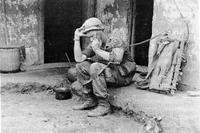John Paul Stroup is an Air Force veteran and lives in Sacramento, California.
The opinions expressed in this op-ed are those of the author and do not necessarily reflect the views of Military.com. If you would like to submit your own commentary, please send your article to opinions@military.com for consideration.
I am 75 and have had many medical issues -- back surgery, two knee replacements, and a recent battle with a couple of cancers to name a few -- so I have gotten to spend a good deal of time at my local Department of Veterans Affairs hospital.
There's a phrase painted on the side of the VA shuttle vans: "All Gave Some, Some Gave All." Each and every one of us made sacrifices, and now we should be given the support needed for a decent quality of life. But too often, when I have returned home from my hospital visits, the home care support I needed wasn't there. The VA needs to create a wider range of home care programs for the well-being of vets across the country.
I served as a medic in the Air Force from the mid-1960s to the mid-70s, and was deployed during the Jordanian Civil War. Since getting out, in addition to the physical ailments I've racked up, I've dealt with invisible wounds including post-traumatic stress disorder and clinical depression.
About six years ago, my doctor prescribed home care services for me. Like a lot of veterans, I resisted getting help at first, but the caregivers turned out to be life-changing. Home care workers made sure I got in and out of the shower safely; prepared my meals; cleaned house and saw to my laundry; reminded me to drink water and take my medications; and took me grocery shopping, among many other duties.
I came to view one caregiver as an angel who seemed to have come to me by God's grace. She didn't just tend to my physical needs, she also became a full-fledged emotional companion who lifted my mood and cheered me up. She would assist me with activities that brought me pleasure, such as working in my garden. Twice, she even drove me nearly an hour south so I could visit my mother's grave.
Sadly, that caregiver is no longer with me, and I've seen way too much turnover with home care workers since. When a caregiver leaves, it can be very painful. Home care can involve extremely intimate, personal tasks -- such as help with toileting -- and each time a stranger comes along, clients can feel very exposed.
At the root of this turnover are outrageously low wages, meager benefits and haphazard training, all of which hurt the ability to attract and retain skilled, competent caregivers. This problem has become a lot worse as other industries have recently raised their pay.
Another issue is that currently the VA offers only a limited number of home care options, which makes it difficult for many veterans who want to choose their own caregivers, such as friends or family. This restricts the pool of available workers at a time when vets are getting older and need more home care services than ever before. There are now 16.5 million veterans in the U.S., half of whom are over the age of 65. Increasingly, many vets like me simply can't find qualified workers to care for them.
The VA has the ability to solve this growing crisis by broadening the range of home care programs available to vets. Veterans should be empowered to choose their own caregivers more easily, if they like, while also receiving help with clerical burdens such as payroll for the caregiver. This would allow veterans more access to care -- even from fellow veterans, especially those who already have medical experience. The VA also needs to ensure that caregivers have much higher wages, good benefits and standardized training.
Home care workers are crucial for veterans. They allow us to remain in our own homes longer with independence and avoid being forced too soon into a nursing home or pushed toward homelessness. We need to make home care a sustainable, middle-class career opportunity that workers can stick with over the long term, so vets receive continuity of care from competent people we trust.
Right now, I am waiting for the next caregiver to be assigned to me, and in the interim I do not have any assistance with my daily activities at home. As I have suffered through and started to recover from cancer, this hit-or-miss caregiving has taken a toll. Veterans across the country are dealing with similar struggles and worse. It's past time for the VA to take action to expand home care services.















